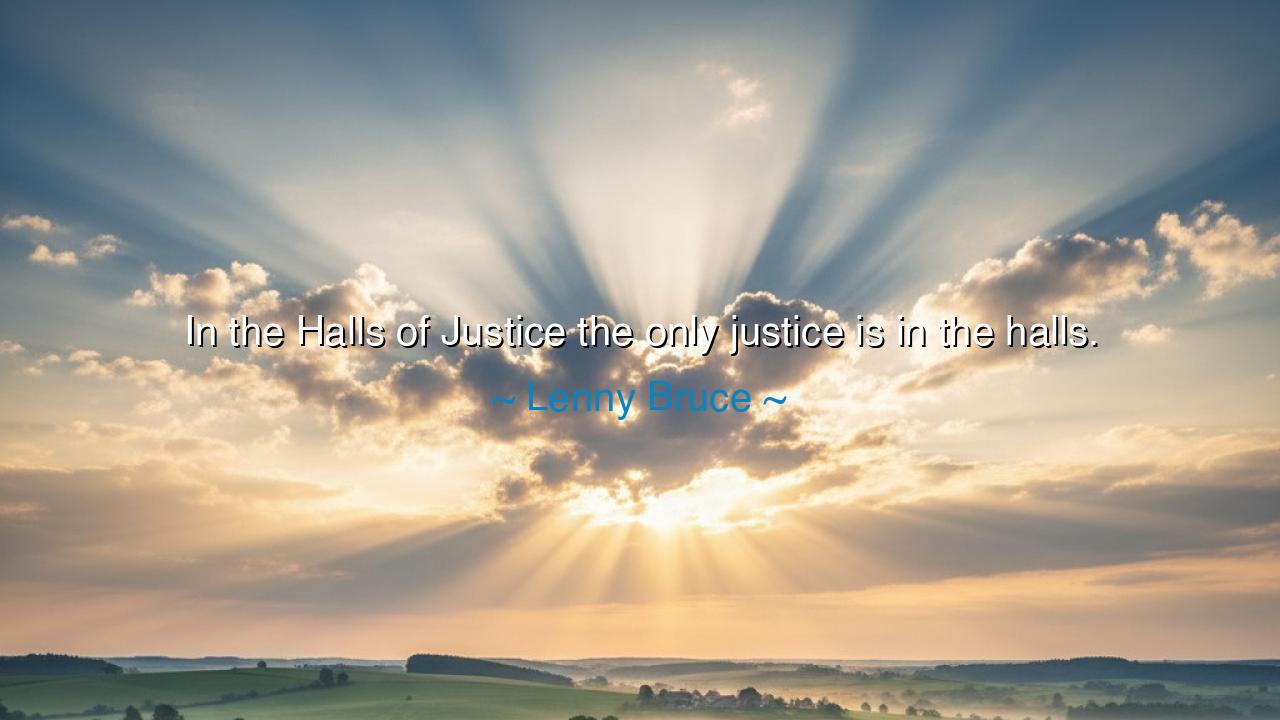
In the Halls of Justice the only justice is in the halls.






The words of Lenny Bruce, “In the Halls of Justice the only justice is in the halls,” strike like a bitter laugh carved into stone. They are not the polished decree of a judge nor the lofty proclamation of a philosopher, but the raw cry of a satirist who lived within the contradictions of his time. In this saying lies an accusation—that the place built to deliver justice often fails in its duty, that fairness is found not within the chambers of law but only in the whispers and waiting of those gathered outside. It is a jest, yes, but one laced with despair, for it reveals the hypocrisy of institutions that claim to protect truth while too often shielding power.
The origin of these words rests in Bruce’s own battles with the legal system. As a comedian, he wielded his tongue like a sword, striking against censorship, hypocrisy, and the false piety of his age. For this he was dragged again and again into courtrooms, accused of obscenity, harassed by officials, condemned not for true crimes but for daring to speak freely. From these experiences, he saw the courtroom not as a sanctuary of fairness but as a theater of control. Thus his saying was born—a lament that inside the halls where justice was promised, he found little of it, and that perhaps more truth and humanity lived outside, among the common people waiting in the corridors.
History itself affirms this wisdom. Consider the trials of Socrates in Athens, accused of corrupting the youth and dishonoring the gods. Though he spoke truth with clarity, though he defended philosophy as a noble pursuit, the court condemned him to death. Was justice found within the tribunal? No, it lived instead in the memory of his students, in the conversations outside the walls, in the enduring legacy of his ideas. Like Bruce, Socrates learned that the halls of power may corrupt justice, while the “halls”—the common ground of the people—may carry it forward.
Yet this saying does not teach us to despise all law or abandon the pursuit of justice. Rather, it reminds us to be vigilant, to understand that institutions can fail when they forget their purpose. Justice is not a building, nor a robe, nor a set of statutes written in books. It is a living spirit, born of fairness, truth, and compassion. When courts become tools of censorship or weapons of the strong, then the true justice escapes them, wandering instead into the hearts and voices of the people outside.
The deeper meaning is this: respect for institutions must always be tied to their integrity. To honor the law blindly, when it no longer serves truth, is to become complicit in injustice. But to hold institutions accountable, to demand that they reflect the fairness they promise, is the duty of a free people. Bruce’s bitter humor reminds us that it is possible to mistake the shell for the essence, the building for the spirit, the letter for the truth. Justice cannot be trapped in marble halls unless those who dwell within them honor it sincerely.
The lesson for us is clear: we must not sit idle, trusting that courts or governments will always defend the right. We must remain watchful, raising our voices when laws are bent to silence truth, when trials become mockeries, when the powerful escape judgment while the weak are condemned. We must seek justice not only in institutions but in daily life, in our dealings with neighbors, in the way we speak and act. For if the halls themselves are empty of justice, it falls upon us to carry it in our words and deeds.
Therefore, let us live with courage. Let us respect the law when it is just, but let us resist it when it becomes a mask for cruelty. Let us remember that true justice is not confined within walls, but dwells wherever fairness is upheld. And let us teach future generations this truth: do not be deceived by appearances of justice, but measure it by its fruits. If mercy, fairness, and truth are absent, then the hall is but a shell; but if they are present—even in the humblest corridor—then there, indeed, justice lives.
So let Bruce’s words echo through the ages: “The only justice is in the halls.” They are a reminder, both sorrowful and sharp, that justice cannot be assumed—it must be fought for, demanded, and lived. In this struggle lies the true dignity of a people, and the only hope for a world where justice might yet be found both within and beyond the halls of power.






AAdministratorAdministrator
Welcome, honored guests. Please leave a comment, we will respond soon